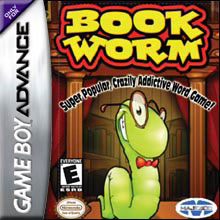As videogame technology improves, new styles of play emerge as public favorites and force some older styles to retreat to smaller audiences or find new ones. The pick-up-and-play puzzle game, once an arcade and home staple with the likes of Tetris and Columns, is one such genre that has faded from mainstream sales charts. This style of game remains a niche on modern consoles, but has found a new, solid home on the Internet. PopCap is one of the leading companies developing simple-to-learn puzzle games to play over the web and has ported one of its more popular games, Bookworm, to the GBA.
As the title foreshadows, words lie at the heart of Bookworm. On the game screen is a grid of letters, with the objective to spell a path of consecutive letters into an actual word. Spell a valid word and the letters disappear while Newton’s Laws pulls the remaining letters down to fill the gap. New letters fill into the top of the grid and your word hunt starts anew. The concept is pleasingly simple and immediately obvious upon starting to play.
The mechanics of word-spelling is clearly inspired by Boggle, while Scrabble has the greatest influence over Bookworm’s scoring system. Each word is awarded a specific number of points, depending on the number of letters in the word and the scarcity of the letters used. You can increase the point total with specially colored bonus letters, which appear at random spots in the grid after spelling high-scoring words. Increasing your point total eventually increases your game level as well. Rather than labeling the levels 1, 2, or anything like that, Bookworm accords you funky names from “Book Burner” to “Bookworm Supreme”.
More importantly, increasing a level leads to an increase in the frequency of flaming blocks. A flaming block consists of a letter just like normal blocks, but every time it is not used it burns itself one letter down the grid. Once a flaming block reaches the bottom of the grid, it’s game over. The gameplay becomes tricky at the higher levels when there are multiple flaming blocks on-screen at once and even provides a challenge at lower levels by interfering with your paths of letters set up for high scores. Flaming blocks are the only serious source of tension behind Bookworm, unless you include external obstacles such as tight schedule or a belligerent spouse.
The gameplay would grind to a halt without an adequate word database, and happily Bookworm appears to be strong in this regard. Just about any word between 3 to 6 letters seems to be represented, and it’s difficult to get a feel for how many longer words are included because of the difficulty in spelling out long words to begin with. The only shorter words that are definitely excluded are certain naughty ones, presumably to maintain the game’s E rating.
Fans of the web version will be hard-pressed to find many significant differences with the GBA version. You can save games and high scores, but the changes don’t go much deeper than that. The graphics have unfortunately taken a bit of a tumble on the GBA. They’re functional enough to clearly display all the relevant information, but a lot of the crispness and a few trimmings were lost in translation. The quality of the sound effects is also slightly downgraded in the GBA version. Admittedly this is no big loss, since they were more of a mild, easily tuned-out distraction in the first place. The music, on the other hand, is just awful. Absent from the web version, there is merely one song in the game that plays incessantly throughout the game, growing old within minutes of turning the GBA on.
A potential disadvantage compared to other puzzle games for some people is that Bookworm games can take a fair bit of time. You’re unlikely to complete a game in one sitting unless you’ve got a lot of time on your hands, as a moderately well-played game can easily take an hour or two to finish. PopCap surely realized this and thankfully provided the option to save the game at any time. Still, Bookworm doesn’t have the same sense of immediacy that a classic action-oriented puzzle game like Tetris has, and will likely appeal mainly to people already interested in word puzzle games.
Further slowing the game down are the GBA controls. The mechanics are the same in the web version but the mouse control there makes the game flow feel quicker. The GBA control pad is slower and clunkier to maneuver than a mouse, and it takes more time to navigate the grid and trace a path of letters. Eventually the controls feel natural enough not to get in the way of the gameplay, but there will always remain that discrepancy in pacing between the GBA and web versions.
It’s a shame that this port isn’t more ambitious, because there’s a downloadable, deluxe and for-pay version of Bookworm for the PC that a faster mode of play, with burning blocks appearing in real-time. This mode seems similar to classic mode at the start, but quickly feels more like an action-oriented puzzle game when flaming blocks appear with ever increasing frequency. Inexplicably, it’s not included in this for-pay version, and would have added some welcome value to the GBA cartridge. As it stands, Bookworm feels like a quick and dirty port, yet the design behind the game is strong enough to deliver solid entertainment here. The focus on words and spelling may be an immediate turnoff for some people, but the game is compelling and intuitive enough to appeal to those who give it a chance. The problem is, there’s a version on the web that’s at least as good and free to play. If you have a readily accessible Internet connection then there’s little reason to play the GBA version, but on the road, it’s a decent way to kill a little time.
